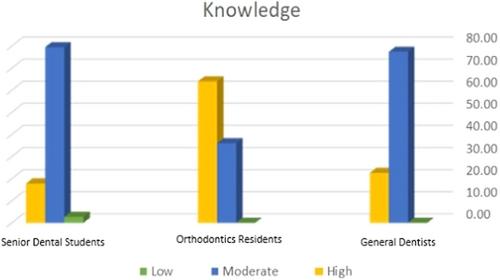Knowledge and Attitude of General Dentists, Senior Dental Students, and Orthodontic Residents Toward Obstructive Sleep Apnea
Abstract
Objective
The main objective of this study was to compare the knowledge and attitude of general dentists, senior dental students, and orthodontic residents toward obstructive sleep apnea (OSA).
Materials and Methods
A questionnaire was designed and administered among 73 senior dental students, 84 general dentists, and 50 orthodontic residents. The questionnaire asked for demographic information of the participants and assessed their knowledge and attitude toward OSA. The validity and reliability of the questionnaire were confirmed by experts. Data were analyzed by the Kruskal−Wallis and Bonferroni tests using SPSS (α = 0.05).
Results
The mean knowledge scores of general dentists and senior dental students were significantly lower than those of orthodontic residents (p < 0.001). However, there was no significant difference in the knowledge score of senior dental students and general dentists (p = 1). The mean knowledge score was significantly higher in dentists with 1–3 years of professional clinical experience (p = 0.02). The knowledge score was the highest in dentists working in private clinics followed by private offices and public clinics. The mean attitude score was the highest in orthodontic residents followed by general dentists and dental students. There was no significant difference in attitude based on the attended university, age, or time of graduation.
Conclusion
According to the results, general dentists had insufficient knowledge about OSA, which could result in under-diagnosis or misdiagnosis of patients with OSA. This finding highlights the need for further education and training for dentists to properly identify and refer OSA patients to orthodontists or sleep specialists.


 求助内容:
求助内容: 应助结果提醒方式:
应助结果提醒方式:


